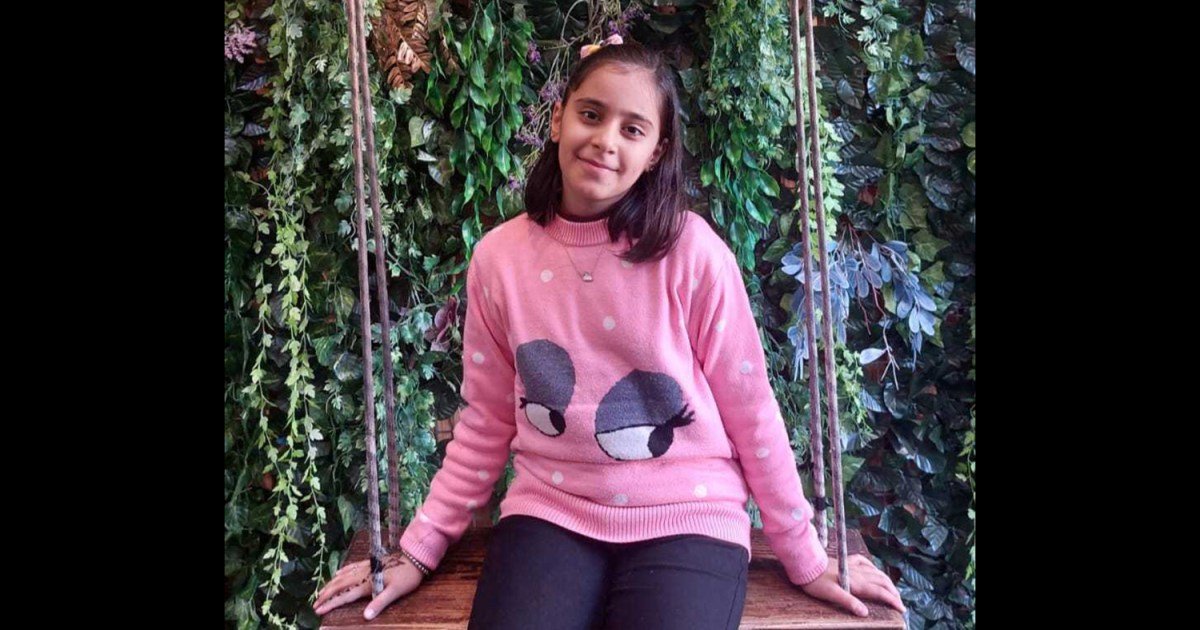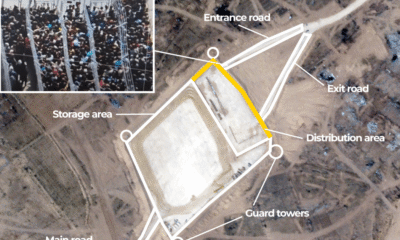Middle East
My sister was the joy of every Eid. Now she is gone | Israel-Palestine conflict

Eid al-Fitr is supposed to be a time filled with joy and celebration. Children should be running around in new clothes, laughing, collecting Eidiya (Eid money the grown-ups distribute) and visiting relatives.
Homes should be filled with the aroma of maamoul and kaak, the traditional Eid cookies, and streets should be alive with gatherings and celebration.
But in Gaza, this is a time of grief. The air is thick with dust from the rubble of destroyed buildings, and the sound of bombardments doesn’t abate.
Instead of joyful reunions, families sit among the ruins, mourning their loved ones.
Many of us are starving, barely holding onto life, wondering if the next bomb will fall on us. Nights are sleepless, haunted by memories and nightmares that do not fade away.
This will be my first Eid without my little sister, Rahaf. She was my only sister, my best friend. During the genocide, we clung to each other, finding comfort in each other.
We spent 13 Eids together on this Earth, and Rahaf was the joy of every one of them. Ever since she could walk, she would wake up before everyone else, running through the house, announcing it had begun.
She would put on her new clothes and ask me to do her hair before we visited our grandmothers in their homes, sitting with the extended family gathered there, drinking tea and eating the sweets the mothers had spent days preparing.
This year, there is nothing to prepare, no place to go, no Rahaf to share it with.
I never thought I would lose her, and I was not prepared for her absence. We dreamed of a future when we would always be by each other’s side to celebrate milestones, creating lives filled with art and words.

I longed to see her become the artist she always dreamed of being, to watch her paintings come to life and witness the world recognise her talent.
We imagined the day I would publish my first book. How we would celebrate together, knowing that no matter where life took us, we would always be each other’s biggest supporters.
Rahaf was taken away from me on December 28.
We were sleeping at home when, at 4am, my uncle’s home right next door was bombed. The explosion destroyed our home too.
Rahaf was asleep in the room closest to my uncle’s house and was crushed.
That was the room I used to sleep in. We had switched places only four days before she was killed.
Ever since then, there has been no time to grieve, no space to process loss. Grief does not ease amid bombs.
How can you heal when every moment threatens to take yet another loved one? How can you find a path forward when the future you envisioned has been stolen?
In the midst of my own grief, I have been reminded that there are those who understand her killing even less than I do.
As we adults carry unbearable anguish, children are left to navigate their own pain alone. They, too, have dreams interrupted by loss, by fear, by the absence of those who once made their world feel safe. My seven-year-old cousin Qamar recently called my attention to that.
One afternoon as I sat on a couch in the home of another uncle who had taken us in when our house was destroyed, Qamar came and sat beside me.
Her little hand reached up, gently touching my arm. I could tell she had been thinking.
“Shahd,” she began, her voice heavy with curiosity, “why aren’t you at your home? Why isn’t it there anymore?”
My heart skipped a beat at the simplicity of her question, yet I felt like it carried the weight of a thousand memories I didn’t know how to explain to those innocent eyes.
“Our home – it was destroyed. There was nothing left after the bombing. We lost everything – the walls, the memories and Rahaf.”
She stared at me for a moment, her eyes wide: “And Rahaf, where is she?”

I knew that Qamar had been told Rahaf was gone, so her question hit me like a cold gust of wind.
The weight of losing Rahaf felt impossible to put into words again for someone so young, especially someone like Qamar, who had known Rahaf’s warm laughter and gentle spirit.
I closed my eyes for a moment. My voice was barely a whisper. “Rahaf is in heaven now. She was taken from us during the bombing, and we can’t bring her back.”
Her face was filled with confusion and innocence. “Why did she have to go? Why did they take her?”
My hands shook as I pulled her close. “I don’t know, Qamar. I wish I could explain it to you in a way that makes sense.”
She whispered, “I want to see her again. I miss her.”
Tears welled up in my eyes, my heart aching. “I miss her too. Every single day. But she will always be with us, in our hearts.”
In that moment, I couldn’t help but wonder about the day when Qamar would understand what war does – not just to the land, but to people. How long before she realises that even when we try to move on, the pain of loss lingers like a shadow.
I don’t want her to understand these things. She’s too young for the weight of this harsh reality. She shouldn’t have to feel this kind of pain and loss.
I wish I could take the children of Gaza and hide them in my heart to protect them from terror, fear and grief.
The world expects us to be strong, to have sumoud (perseverance), but the emotional exhaustion of living through war and loss leaves little room for anything else.
The weight of survival without the luxury of healing is a burden. There is no closure in a genocide that continues to unfold.
There’s no space to grieve when survival demands every ounce of strength.
But we hold onto the love of those we have lost, keeping them alive in our memories, our words and our fight to exist.
Hope, however fragile, is an act of resistance.
It keeps us searching for light in the ruins, for meaning in absence, for life beyond mere survival.
It reminds us that we are still here. And that matters.
Middle East
Iraq probes fish die-off in marshes | In Pictures News

Iraqi authorities have opened an investigation into a mass die-off of fish in the country’s central and southern marshlands, the latest in a series of such incidents in recent years.
One possible cause for the devastation is a shortage of oxygen, triggered by low water flow, increased evaporation and rising temperatures driven by climate change, according to officials and environmental activists. Another is the use of chemicals by fishermen.
“We have received several citizens’ complaints,” said Jamal Abd Zeid, chief environmental officer for the Najaf governorate, which stretches from central to southern Iraq, adding that a technical inspection team had been set up.
He explained that the team would look into water shortages, electrical fishing, and the use by fishermen of “poisons”.
For at least five years, Iraq has endured successive droughts linked to climate change. Authorities further attribute the severe decline in river flow to the construction of dams by neighbouring Iran and Turkiye.
The destruction of Iraq’s natural environment adds another layer of suffering to a country that has already faced decades of war and political oppression.
“We need lab tests to determine the exact cause” of the fish die-off, said environmental activist Jassim al-Assadi, who suggested that agricultural pesticides could also be responsible.
Investigations into similar incidents have shown that the use of poison in fishing can lead to mass deaths.
“It is dangerous for public health, as well as for the food chain,” al-Assadi said. “Using poison today, then again in a month or two … It’s going to accumulate.”
Middle East
Iran demands sanctions relief guarantee in nuclear talks with US | Nuclear Weapons News

Washington has not been clear on ‘how and through what mechanism’ sanctions would be lifted, says Tehran.
Iran has demanded that the United States clarify exactly how sanctions will be lifted if the two sides are to reach a new agreement on Tehran’s nuclear programme.
Ministry of Foreign Affairs spokesman Esmail Baghaei made the comments on Monday, days after the US submitted what it described as an “acceptable” proposal. Unverified reports claim that Iran sees the offer as a “non-starter” and is preparing to reject it.
The pair has conducted seven weeks of negotiations over the nuclear programme, with the US seeking assurances that it is peaceful, while Iran hopes to escape punishing sanctions that have battered its economy in recent years.
However, Tehran is now demanding Washington detail what it is offering, reflecting scepticism voiced earlier this year by Supreme Leader Ayatollah Ali Khamenei.
In remarks carried by the official IRNA news agency, Baghaei stressed the need for guarantees regarding the “real end of the sanctions”, including details on “how and through what mechanism” they would be removed.
“The American side has not yet provided the necessary clarity in this regard,” he said.
Baghaei also reiterated Iran’s intention to continue enriching uranium for “peaceful” purposes.
US envoy Steve Witkoff has said President Donald Trump opposes Tehran continuing any enrichment, calling it a “red line”.
A leaked United Nations report shows that Iran has ramped up production of uranium enriched to 60 percent, short of the roughly 90 percent required for atomic weapons but significantly above the 4 percent or so needed for power production.
Baghaei dismissed the report as biased, accusing unnamed Western countries of pressuring the UN to act against Iran’s interests.
Official sources cited by The New York Times said the recent US proposal includes a call for Iran to end all enrichment.
While Tehran has confirmed receipt of the proposal, which the White House described as being in Iran’s “best interest”, it has said it is still reviewing the document.
“Receiving a text certainly does not mean accepting it, nor does it even mean that it is acceptable,” Baghaei said.
The Reuters news agency quoted an unnamed Iranian diplomat as saying that Tehran is in the process of “drafting a negative response to the US proposal, which could be interpreted as a rejection”.
The official described the proposal as a “non-starter” because it does not soften the US’s stance on enrichment or offer a “clear explanation” of sanctions relief, according to the report.
Iran has held five rounds of talks with the US since April 12 in search of a new agreement to replace the deal with the leading powers that Trump abandoned during his first term in 2018.
Middle East
Aid ship aiming to break Israel’s siege of Gaza sets sail from Italy | Israel-Palestine conflict News

The 12-person crew, which includes climate activist Greta Thunberg, expects to take seven days to reach Gaza.
International nonprofit organisation Freedom Flotilla Coalition (FFC) says one of its vessels has left Sicily to deliver humanitarian aid to Gaza, after a previous attempt failed due to a drone attack on a different ship in the Mediterranean.
The 12-person crew, which includes Swedish climate activist Greta Thunberg, Irish actor Liam Cunningham and Franco-Palestinian MEP Rima Hassan, set sail on the Madleen from the port of Catania on Sunday, carrying barrels of relief supplies that the group called “limited amounts, though symbolic”.
The voyage comes after another vessel operated by the group, the Conscience, was hit by two drones just outside Maltese territorial waters in early May. While FFC said Israel was to blame for the incident, it has not responded to requests for comment.
“We are doing this because no matter what odds we are against, we have to keep trying, because the moment we stop trying is when we lose our humanity,” Thunberg told reporters at a news conference before the departure. The Swedish climate activist had been due to board the Conscience.
She added that “no matter how dangerous this mission is, it is nowhere near as dangerous as the silence of the entire world in the face of the lives being genocised”.
🇵🇸 ⛵️ Avec @GretaThunberg nous appelons à la mobilisation citoyenne pour soutenir massivement le navire humanitaire de @GazaFFlotilla ! C’est le seul moyen de garantir notre sécurité. 🙏 pic.twitter.com/5DUJbkRdPZ
— Rima Hassan (@RimaHas) June 1, 2025
The activists expect to take seven days to reach their destination, if they are not stopped.
The FCC, launched in 2010, is a non-violent international movement supporting Palestinians, combining humanitarian aid with political protest against the blockade on Gaza.
It said the trip “is not charity. This is a non-violent, direct action to challenge Israel’s illegal siege and escalating war crimes”.
United Nations agencies and major aid groups say Israeli restrictions, the breakdown of law and order, and widespread looting make it extremely difficult to deliver aid to Gaza’s roughly two million inhabitants.
The situation in Gaza is at its worst since the war between Israel and Hamas began 19 months ago, the UN said on Friday, despite a resumption of limited aid deliveries in the Palestinian enclave.
Under growing global pressure, Israel ended an 11-week blockade on Gaza on May 19, allowing extremely limited UN-led operations to resume.
On Monday, a new avenue for aid distribution was also launched: the Gaza Humanitarian Foundation, backed by the United States and Israel, but with the UN and international aid groups refusing to work with it, saying it is not neutral and has a distribution model that forces the displacement of Palestinians.
The FCC is the latest among a growing number of critics to accuse Israel of genocidal acts in its war in Gaza, allegations Israel vehemently denies.
“We are breaking the siege of Gaza by sea, but that’s part of a broader strategy of mobilisations that will also attempt to break the siege by land,” said activist Thiago Avila.
Avila also mentioned the upcoming Global March to Gaza – an international initiative also open to doctors, lawyers and members of the media – which is set to leave Egypt and reach the Rafah crossing in mid-June to stage a protest there, calling on Israel to stop the Gaza offensive and reopen the border.
-

 Lifestyle5 days ago
Lifestyle5 days agoFaizan Zaki hopes to go from spelling bee runner-up to champ
-

 Lifestyle4 days ago
Lifestyle4 days agoChildren and careers: Talking to kids about what they want to be when they grow up
-

 Europe4 days ago
Europe4 days agoTop Kremlin aide says Trump ‘not sufficiently informed’ about Ukraine after US president lashes out at Putin
-

 Sports4 days ago
Sports4 days agoThe Knicks are bringing hope and title dreams back to New York after years in the doldrums
-

 Africa5 days ago
Africa5 days agoHaiti health officials meet to discuss shortage of HIV/AIDS medication
-

 Conflict Zones4 days ago
Conflict Zones4 days agoCambodia PM urges calm after border clash with Thailand leaves soldier dead | Border Disputes News
-

 Middle East4 days ago
Middle East4 days agoVisual guide to how the Gaza aid distribution turmoil unfolded | Israel-Palestine conflict News
-

 Asia4 days ago
Asia4 days agoAnalysis: China thought it had a truce with the US. Then Trump dropped two bombshells




